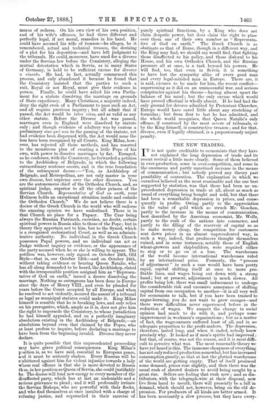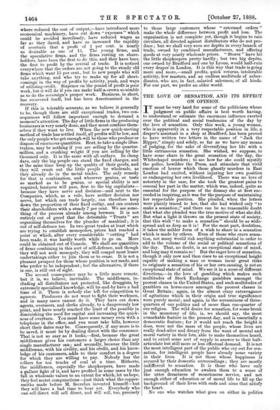THE NEW TRADING.
TT is not quite creditable to economists that they have not explained the long depression of trade and its recent revival a little more clearly. Some of them believed in over-production, some in over-competition, and some in the enormous and partly unnoticed increase in the means of communication ; but nobody proved any theory past possibility of contention. The explanation in which we ourselves believed as the most reasonable and the one best supported by statistics, was that there had been no un- precedented depression in trade at all, about as much as usual of everything being bought and sold, but that there had been a remarkable depression in prices, and conse- quently in profits. Owing partly to the appreciation in the value of gold which so struck Mr. Goschen, partly to the increase in the means of communication, best described by the American economist, Mr. Wells, partly to the rush of the nations into commerce, and partly to the filling of the reservoir of capital so as to make money cheap, the competition for customers sent down prices in an almost unprecedented way, in such a way, indeed, that producers thought themselves ruined, and in some instances, notably those of English wheat-growers and shipbuilders, were required either to stop or to go on at a loss. The warehouses of the world become international warehouses ruled by an international price. Formerly, the "process of adjustment" in such a case would have been pretty rapid, capital shifting itself at once to more pro- fitable lines, and wages being cut down with a strong hand ; but at present, adjustment is much slower. All profits being low, there was small inducement to undergo the considerable risk and excessive annoyance of shifting capital from one occupation to another—it is all very well for economists to talk, but if you have been trained to sugar-burning, you do not want to grow oranges—and there were difficulties never experienced before in the reduction of wages. We suspect the change in social opinion had much to do with it, and perhaps some improvement in workmen's organisations ; but as a matter of fact, the wage-earners suffered least of all, and in no adequate proportion to the profit-makers. The depression, therefore, lasted long, and when it ended, nobody knew precisely why. It looked as if men's spirits had improved ; but that, of course, was not the reason, and it is most diffi- cult to perceive what was. The most reasonable theory we have yet heard is this. The immense cheapness of everythiig has not only reduced production somewhat, but has increased consumption greatly, so that at last the glutted warehouses of the world are getting empty. That of itself produced some demand, prices rose slightly, and then there was the usual rush of shrewd dealers to avoid being caught by a great rise. Sellers are feeling that rush now ; and as dis- tributors, with the telegraph-wire at their disposal, now live from hand to mouth, there will presently be a lull in demand, which should not, however, bring on the old de- pression. For producers of all kinds are better armed. It has been necessarily a slow process, but they have every- where reduced the cost of output,—have introduced more economical machinery, have cut down " expenses " which could be avoided mercilessly, have reduced wages as far as they dared, and have so increased the rapidity of overturn that a profit of 5 per cent. is nearly as desirable as one of 15. The young firms, and the speculative firms, and the firms resting on share- holders, have been the first to do this, and they have been the first to profit by the revival of trade. It is noticed everywhere that the orders are not going to the steady old firms which want 15 per cent., but to new people who will take anything, and who try to make, up for all short- comings in the way of profits by activity, push, and ways • of utilising credit. Sixpence on the pound of profit is poor work, but it will do if you can make half-a-crown so nimble as to do the sovereign's proper work. Business, in short, has recovered itself, but has been Americanised in the recovery. If this is tolerably accurate, as we believe it generally to be, though there are still exceptional trades, two con- sequences will follow important enough to demand a moment's attention. The day of little firms in the producing businesses is very nearly done, and. they must combine them- selves if they want to live. When the new quick-moving method of trade has settled itself, all profits will below, and the only people who get enough will be those who produce or dispose of enormous quantities. Rent, to take a single illus- tration, may be nothing if you are selling by the quarter million, and a crushing weight if you are selling by the thousand only. It is the same with all outlays. In cheap days, only the big people can stand the fixed charges, and at the same time keep up the quality of their goods, and they will crush out the little people by wholesale, as they already do in the metal trades. The only remedy for that is combination, and wherever genius, or taste so marked as to be genius, or special ability is not required, business will pass, first to the big capitalists— because they have nerve and decision—and next to the Companies, which, as a rule, have neither decision nor nerve, but which can trade largely, can therefore keep clown the proportion of their fixed outlay, and can content their shareholders with a steady 7 per cent. We see some- thing of the process already among brewers. It is not entirely out of greed that the detestable " Trusts " are organising themselves for the plunder of mankind ; it is out of self-defence too. In two great trades at least which are trying to establish monopolies, prices had reached a point at which, after every considerable " cutting " had been made, it was hardly worth while to go on. More could be obtained out of Consols. We shall see quantities of firms combining in this sort of self-defence, and though they will not seek monopoly, they will compel most lesser undertakings either to join them or to cease. It is not a pleasant prospect for those whose position is not made, and who prefer to be independent; but the alternative, if there is one, is still out of sight. The second consequence may be a little more remote, but it is, we believe, inevitable. The middlemen, in- cluding all distributors not protected, like druggists, by extremely specialised knowledge, will by-and-by have a bad time of it. There is nobody else left for competition to squeeze. Producers do not want to fight their workmen, and in many cases cannot do it. They have cut down agents, overseers, and clerks already, to a dangerously low point, and have nearly reached the limit of the possible in diminishing the need for capital and increasing the quick- ness of overturn. You must have some money even with a telephone in the office, and you must take bills, however short their dates may be. Consequently, if any more is to be saved, it must be by dealing direct with the consumer. That is not so easy as it looks,—first, because the great middleman gives his customers a larger choice than any single manufacturer can ; and. secondly, because the little middleman, with his civility, and his credit, and his know- ledge of his customers, adds to their comfort in a degree for which they are willing to pay. Nobody has the cellars for ten trucks of coal at a time. Hitherto, the middlemen, especially the shopkeepers, have made a gallant fight of it, and have profited in some cases by the fall in wholesale values to an extent for which, let us hope, they feel secret compunctions—just think what the copper- smiths made before M. Secretan invented himself—but they will have a bad time to bear yet. Everybody who can sell direct will sell direct, and will sell, too, precisely to those large customers whose "esteemed orders ." make the whole difference between profit and loss. The organisation is not complete yet, though it begins to rain circulars, all directed against distributors who do not pro- duce ; but we shall very soon see depots in every branch of trade, owned by combined manufacturers, and offering goods at very nearly wholesale prices. " Stores " have hit the little shopkeepers pretty hardly ; but two big depats, one owned by Bradford and one by Lyons, would half-ruin every draper in London. It is this way that trade is going more and more,—small profits, quick returns, intolerable activity, few masters, and an endless multitude of subor- dinates, who are, in fact, salaried salesmen, of all kinds. For our part, we prefer an older world.







































 Previous page
Previous page